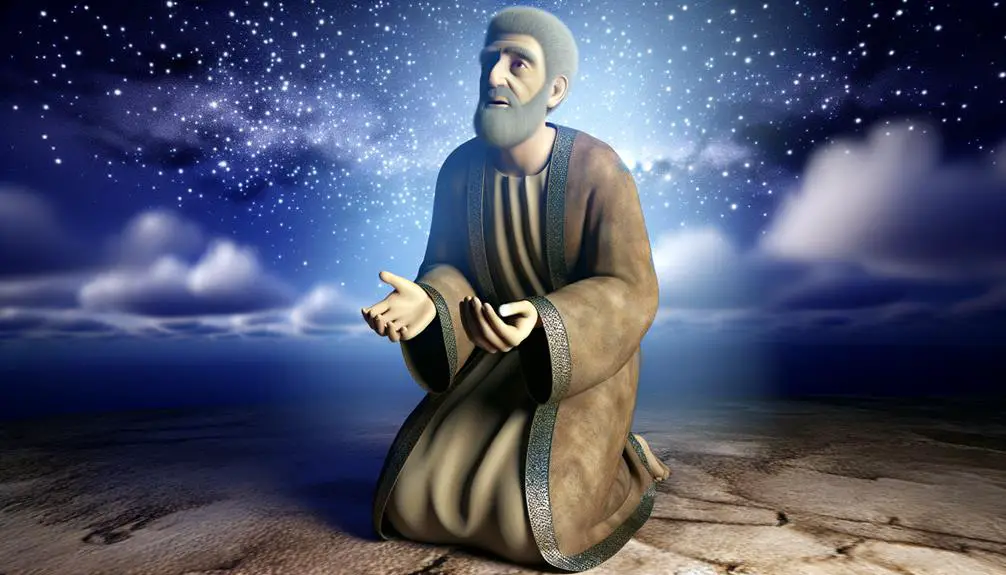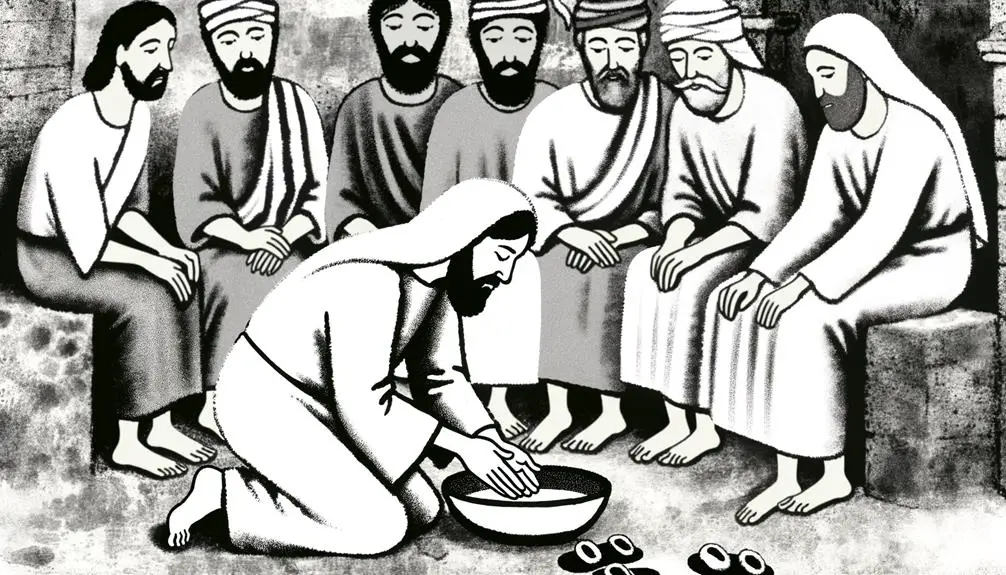Biblical tales of humility reveal life's profound lessons, inviting us to discover the strength in gentleness and the power of a humble heart.

Story of Humbleness in the Bible
Like a seed that falls to the ground and dies to produce a great harvest, the Bible is rich with stories of humbleness that yield profound lessons.
You'll find that from Moses' quiet strength in leading a nation, to Mary's gentle acceptance of her role in a story much larger than herself, these narratives aren't just ancient tales. They're a blueprint for navigating life's complexities with grace.
As you explore these stories further, you'll uncover how humility isn't about diminishing oneself, but rather, about recognizing one's place in the grand tapestry of life and the strength that comes from it.
Key Takeaways
- Humility is a central virtue in the Bible, exemplified by figures like Moses, David, and Jesus.
- Biblical narratives often link humility with divine favor and wisdom, as seen in Solomon's story.
- True leadership in the Bible is depicted as service and humility, challenging cultural norms.
- Humility leads to spiritual growth, urging individuals to align with a greater purpose and embrace personal transformation.
Moses: The Humble Leader

Despite his unparalleled achievements, Moses is often celebrated as the epitome of humility in the Bible, setting a precedent for leadership grounded in modesty rather than arrogance. You might recall that Moses' life, as narrated in the Hebrew Scriptures, is marked by moments that underscore his humility, despite being chosen for a monumental task. This humility is notably evident in his reaction to the divine encounter at the burning bush. Here, Moses is confronted with a divine commission, yet his response is one of hesitation, rooted in a profound sense of unworthiness. He doesn't immediately embrace the call with open arms; instead, he questions his own capabilities, highlighting his stutter as a significant impediment.
This moment is reflective not merely of Moses' personal insecurities but also serves as a testament to his deference to a power greater than himself. His stutter, rather than being a mere footnote in his story, symbolizes the human frailties that Moses acknowledges. It's a powerful reminder that humility involves recognizing one's limitations and being open to guidance and strength from beyond oneself.
Analyzing Moses' leadership through the lens of his encounter at the burning bush, it's evident that his humility wasn't a sign of weakness but a source of strength. It was this very humility that equipped him to lead his people out of bondage, steering through challenges with a steadfastness rooted in a humble acknowledgment of his dependence on divine guidance. Moses' legacy, therefore, isn't just one of liberation and law-giving but equally one of leading with humility, a lesson that remains as relevant today as it was millennia ago.
David's Respect for Saul

You'll observe that David's approach to Saul, despite Saul's pursuit to end his life, exemplifies an unparalleled form of humbleness.
His restraint from harming Saul, even when opportunities arose, underscores a profound respect not just for the person of Saul, but for the divine appointment that Saul represented.
This act of honor towards God's anointed offers a striking lesson in humility and reverence, setting a precedent for understanding the complexities of humility in leadership dynamics.
David's Restraint
David's restraint in his dealings with Saul exemplifies a profound respect for authority and a deep-seated humility that transcends personal vendetta. Emerging from his shepherd life, David's journey to the royal courts wasn't merely a transition from obscurity to fame. His victory in the Goliath battle, while a defining moment, also marked the beginning of a complex relationship with King Saul.
This relationship, fraught with jealousy and threats, tested David's character. Yet, you observe his refusal to harm Saul, despite having opportunities. This wasn't mere political savvy; it was a reflection of his moral compass, shaped by his humble beginnings and experiences.
David's life teaches you that true strength often lies in the power of restraint, a lesson as relevant today as it was then.
Honor for God's Anointed
Exploring further, it becomes evident that David's refusal to harm Saul, even when presented with clear opportunities, underscores a profound honor for the divine appointment of God's anointed king. This act of restraint wasn't born out of fear or indecision but from a deep-seated respect for the position Saul held, anointed by God despite Saul's jealousy.
David's perspective starkly contrasts with Saul's obsessive pursuit, driven by envy and fear of losing power. Meanwhile, Jonathan's loyalty to David, despite his father Saul's intentions, further illuminates the complex dynamics at play.
Jonathan's actions serve not only as a bridge between David and Saul but also as a testament to the enduring value of righteousness and respect for God's will, even in the face of personal risk or familial allegiance.
Solomon's Request for Wisdom

You now encounter Solomon's humble approach to divine guidance, marking a pivotal moment in biblical narratives. His prioritization of wisdom over material wealth embodies a profound lesson in spiritual values.
This choice prompts a generous divine response, illustrating the rewards of humility and the pursuit of enlightened leadership.
Solomon's Humble Prayer
One of the most profound examples of humility in the Bible is Solomon's earnest prayer requesting wisdom from God, rather than riches or power. This moment, often encapsulated as the king's dream, signifies a pivotal turn in Solomon's life and reign. By choosing to seek divine wisdom, Solomon exhibits a deep understanding of the true essence of leadership and stewardship.
His request, void of self-serving desires, illuminates the path of humility. Solomon's approach to kingship, grounded in the pursuit of wisdom over material gains, showcases an admirable prioritization of communal well-being and justice. This narrative not only reflects Solomon's humility but also underscores the value of wisdom in guiding one's actions and decisions. It's a testament to the power of prioritizing spiritual over worldly wealth.
Wisdom Over Riches
Building on Solomon's humble prayer, his request for wisdom over riches marks a significant departure from conventional royal aspirations, highlighting a profound understanding of true leadership and the enduring value of divine guidance. This choice reveals the depth of Solomon's character, prioritizing wisdom over wealth acquisition, a rare stance that challenges the typical correlation between personal ambition and success. It's a testament to the value placed on wisdom in leadership, advocating for qualities that ensure just and effective governance over mere material gain.
Aspect |
Solomon's Choice |
Conventional Choice |
|---|---|---|
Focus |
Wisdom |
Wealth Acquisition |
Aim |
Effective Leadership |
Personal Ambition |
Outcome |
Divine Guidance |
Material Gain |
Impact |
Just Governance |
Self-enrichment |
Legacy |
Enduring Value |
Temporal Success |
God's Generous Response
In response to Solomon's humble request for wisdom, God's generous reaction not only fulfilled but exceeded the king's desires, setting a precedent for divine-human interactions that underscore the value of spiritual over material wealth. This moment epitomizes divine generosity and unconditional support, offering profound insights:
- Divine generosity isn't bound by our expectations; it often surpasses them.
- Unconditional support from the divine realm is rooted in the purity of our intentions.
- The prioritization of spiritual wealth over material riches draws closer divine favor and wisdom.
- This narrative serves as a timeless reminder that humility and the pursuit of wisdom yield greater rewards than the pursuit of power and wealth, aligning with the deeper values of divine generosity and support.
The Humility of Mary

Mary's humility, exemplified through her acceptance of God's will, serves as a foundational model for Christian devotion and perspective. At the heart of her humbleness is Mary's Fiat, an unequivocal 'yes' to the divine plan revealed to her during the Annunciation. This moment of Annunciation humility isn't just a passive submission; it's an active, courageous embrace of a role that would forever alter the course of her life and, indeed, human history.
Analyzing Mary's response, you find a profound lesson in humility. It's not merely about accepting one's lot in life but about recognizing and embracing the part one has to play in a larger narrative, even when that role comes with uncertainty and potential hardship. Mary's acceptance reflects a trust in God's wisdom and a relinquishment of personal control, hallmarks of true humility.
Moreover, Mary's humility isn't characterized by self-degradation or false modesty. Instead, it's a recognition of her position in relation to God and her openness to serve according to His will. This aspect of her humility challenges the often misconstrued notion that humility equates to low self-esteem or self-worth. Mary, in her humble acceptance, embodies strength, faith, and a deep sense of purpose.
Reflecting on Mary's example, it's clear that her humility isn't a sign of weakness but a profound strength. Her story urges you to consider how humility can manifest in your life, not as mere acquiescence but as an active, deliberate choice to align your will with a greater purpose, much like Mary did during the Annunciation.
Jesus Washes the Disciples' Feet

Reflecting on Mary's example of humility, consider another profound demonstration of this virtue: when Jesus washes the disciples' feet. This act, recorded in the Gospel of John, stands as a pivotal moment in the narrative of servant leadership, challenging both the disciples and contemporary readers to rethink their understanding of power and service.
Analyzing this event, we uncover several key insights:
- Subversion of Cultural Norms: In Jesus' time, washing the feet of guests was a task reserved for servants or those of lower social standing. By performing this act, Jesus purposefully overturns societal expectations, illustrating that true leadership is rooted in service to others.
- A Model of Servant Leadership: Jesus' actions provide a tangible example of servant leadership. He demonstrates that leading others isn't about wielding power, but about humbling oneself and prioritizing the needs of others.
- Personal Sacrifice as a Leadership Quality: The act of washing the disciples' feet wasn't merely a lesson in humility; it was a foreshadowing of the ultimate sacrifice Jesus would make on the cross. This underscores the depth of humility involved in leadership—the willingness to lay down one's life for others.
- A Call to Action: Finally, this story isn't just historical; it's instructive. Jesus explicitly tells his disciples, 'I have set you an example that you should do as I've done for you.' This isn't merely a call to wash feet but to adopt a posture of humility and service in all aspects of life.
In essence, the act of Jesus washing the disciples' feet challenges us to reconsider our own perspectives on power, leadership, and service, urging us to embody humility in our interactions and societal roles.
The Parable of the Pharisee and the Tax Collector

Turning our focus to another compelling illustration of humility, the Parable of the Pharisee and the Tax Collector offers profound insights into the nature of true righteousness and self-perception. In this narrative, you're presented with two characters: a Pharisee and a tax collector, embodying polar attitudes towards righteousness and societal judgment.
The Pharisee stands, praying with self-righteous pride, thanking God he's not like other people, including the tax collector. In stark contrast, the tax collector stands at a distance, too ashamed even to look up to heaven, beating his breast and begging for God's mercy.
This parable masterfully dissects the human tendency to judge oneself favorably in light of others' perceived shortcomings. It's a poignant reminder that societal judgment often misses the mark on true righteousness. The Pharisee, respected and outwardly righteous, falls into the trap of self-glorification, failing to recognize his need for humility and self-reflection. Conversely, the tax collector, despised by society, embodies humility, fully aware of his flaws and pleading for mercy.
This story challenges you to delve into self-reflection, questioning how you perceive yourself and others. It's a call to recognize that true righteousness isn't about societal standing or outward appearances but about the humility and sincerity of one's heart before God. As you reflect on this parable, it encourages a reevaluation of your judgments and perceptions, advocating for a life marked by genuine humility and a recognition of one's own need for grace and mercy.
Paul's Transformation and Humility

Building on the theme of humility illustrated through the Parable of the Pharisee and the Tax Collector, we now examine the profound transformation and embodiment of humility in the life of Paul. His journey from a persecutor of Christians to a pivotal figure in Christianity is a powerful testament to the radical change humility can bring about in one's life. Central to this transformation is Paul's encounter on the Damascus Road, an event that not only redirected his life but also offers deep insights into the nature of spiritual blindness and the grace of humility.
Here are four key aspects of Paul's transformation that highlight the essence of humility:
- Recognition of Spiritual Blindness: On the Damascus Road, Paul was struck blind, a physical manifestation of his spiritual blindness. This moment forced him to confront his own failings and limitations, setting the stage for his humbling realization of the truth.
- Dependence on Others: Paul's blindness necessitated reliance on those he once persecuted, illustrating how true humility involves acknowledging our need for others and accepting help with grace.
- Radical Change of Heart and Purpose: Paul's transformation wasn't just a change of belief but a complete overhaul of his life's purpose, driven by a humble submission to a cause greater than himself.
- Lifelong Commitment to Service: Paul's humility wasn't a momentary change but a lifelong commitment to serving others and spreading the message of love and redemption, a true sign of his understanding and embodiment of humility.
Through Paul's story, you're reminded that humility can lead to profound personal transformation, challenging you to confront your own spiritual blindness and embrace change with an open heart.
Frequently Asked Questions
How Does the Concept of Humility in the Bible Compare to Modern Secular Interpretations of Humility?
You're exploring how the concept of humility has evolved from its biblical roots to modern secular interpretations.
It's fascinating to see the historical evolution and how cultural perceptions have shifted. Initially, humility was deeply spiritual, focusing on modesty before a divine entity. Today, it's seen more as a social virtue, emphasizing self-awareness and respect for others' worth.
This shift reflects broader changes in societal values and beliefs, offering a reflective analysis of humility's role.
Are There Any Biblical Figures Who Struggled With Pride Before Embracing Humility, Aside From Those Mentioned in the Article?
Imagine standing at a crossroads, one path leads to pride, the other to humility. You're not alone in this journey.
Nebuchadnezzar's transformation from a prideful king to a humble servant and Jonah's lesson in humility after fleeing his divine mission, exemplify the struggles with pride before embracing humility.
Analyzing these figures, you'll find that their stories aren't just ancient tales, but reflective guides for navigating the complex terrain of humility in one's own life.
How Has the Theme of Humility in the Bible Influenced Contemporary Religious Practices or Teachings Outside of Christianity?
The theme of humility in religious teachings has transcended Christianity, influencing contemporary practices and teachings in various faiths. Through interfaith dialogues, you'll find that humility's core values have fostered mutual respect and understanding among different religions.
Cultural adaptations have further integrated these principles into daily practices, reflecting a shared reverence for humility's role in spiritual growth. This cross-pollination of ideas demonstrates humility's universal appeal and its capacity to bridge diverse religious beliefs.
Can the Practice of Humility as Depicted in the Bible Be Applied to Leadership in Non-Religious Contexts, Such as in Business or Politics?
Sure, let's pretend leaders in business and politics don't need a dose of biblical humility like a fish needs water.
When you apply the practice of humility to leadership dynamics, you're not just adding a nice-to-have trait; you're fundamentally transforming how power is wielded.
It's about cultural adaptability, reflecting deeply on one's actions and decisions.
This isn't just beneficial; it's essential for any leader looking to be genuinely effective in today's interconnected world.
What Psychological Benefits, if Any, Does the Bible Suggest Might Come From Practicing Humility, Based on the Stories Not Covered in the Article?
You're exploring how humility might offer psychological advantages, focusing on self-esteem impacts and mental peace benefits.
Analyzing this concept, it's clear that adopting humility could elevate your self-esteem by reducing ego conflicts and fostering a sense of inner worth that isn't tied to external achievements.
Additionally, this practice may lead to mental peace by encouraging acceptance and reducing the stress of constant competition, thereby enhancing your overall psychological well-being.
Conclusion
In your journey through these biblical narratives, you've witnessed the essence of humility, a virtue likened to a quietly flowing river that carves canyons through the hardest of rocks. This paradoxical strength, seen in figures from Moses to Paul, underscores a profound truth: true greatness doesn't shout its presence but manifests in selfless service and wisdom-seeking humility.
Reflecting on these stories encourages a deep reassessment of what it means to lead, learn, and live with genuine humbleness in a world that often values the opposite.



Sign up